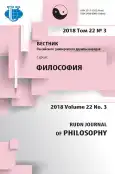ЭТИКА НАУКИ И ОТВЕТСТВЕННОСТЬ УЧЕНОГО
- Авторы: Мухаметжанова В.С.1
-
Учреждения:
- Российский университет дружбы народов
- Выпуск: Том 22, № 3 (2018)
- Страницы: 301-309
- Раздел: ПРОБЛЕМА ОТВЕТСТВЕННОСТИ В ВЫСОКОТЕХНОЛОГИЧНОМ ОБЩЕСТВЕ
- URL: https://journal-vniispk.ru/2313-2302/article/view/344847
- DOI: https://doi.org/10.22363/2313-2302-2018-22-3-301-309
- ID: 344847
Цитировать
Полный текст
Аннотация
В статье рассматривается понятие этики науки, а также вопрос ответственности ученых в современном обществе. Автором раскрываются такие ключевые понятия, как этика науки, этос науки, определяется профессиональная и социальная ответственность ученого. Бурное развитие научно-технического прогресса обусловило появление новых проблем и моральных ситуаций, связанных с этикой. Особый интерес для общества сегодня представляет проблема ответственности ученого за результаты его деятельности, за полноценную выработку научного «продукта». В своей статье автор разделяет понятие ответственности на два вида - внешнюю и внутреннюю. Внешняя ответственность реализуется во взаимоотношениях науки и общества, и поэтому ее принято называть социальной. Внутренняя же представлена профессиональной ответственностью ученого в пределах научного сообщества. Как отмечает автор, проблема ответственности ученых тесна связана с вопросами свободы личности и морального выбора. В статье определяются основные нормы профессиональной этики ученого, среди которых запрет на плагиат, искажение результатов научных исследований, бескорыстный поиск и отстаивание истины, проблема свободы научного поиска и социальной ответственности ученого и т.д. Особый интерес для этики науки представляет проблема моральной оценки собственно познавательной деятельности ученого, для обозначения которой используют термин «этос науки». Концепция Р. Мертона определила этические нормы, которые служат для утверждения и защиты специфических ценностей науки, в числе которых и бескорыстный поиск, и отстаивание истины. Социальные нормы, кодифицированные Р. Мертоном в этосе науки в так называемый CODUS, представлены четырьмя основными принципами - универсализмом (Universalism), коммунизмом (Communism), внезаинтересованностью или бескорыстностью (Disinterestedness), организованным скептицизмом (Organized Skepticism). В статье также говорится и о социальной ответственности ученого. Особенно остро проблемы нравственности науки стоят для ученых в прикладных областях: генная инженерия, биотехнология, биомедицинские и генетические исследования человека и т.д. В результате научных открытий и экспериментов создаются новые «продукты» деятельности ученых, порой последствия которых могут носить необратимые процессы не только для всего человечества, но и для самой науки. Также усиление ответственности ученых перед обществом связаны и с социальными изменениями самой науки. Сегодня, в условиях научно-технической революции, меняется ориентация науки, она смещается в сторону познания социальной природы человека. Научному сообществу важно осознавать не только профессиональную ответственность за применение полученных результатов деятельности, но и социальные последствия их применения. А также особое внимание стоит обратить на повышение гуманитарного контроля со стороны общественности за деятельностью современных ученых и научного сообщества в целом.
Об авторах
Винера Саяровна Мухаметжанова
Российский университет дружбы народов
Автор, ответственный за переписку.
Email: mukhametzhanova_vs@rudn.university
кандидат социологических наук, доцент кафедры этики факультета гуманитарных и социальных наук Российского университета дружбы народов
ул. Миклухо-Маклая, 6, Москва, Россия, 117198Список литературы
- Mishatkina TV, Jaskevich JaS, Vjazovkin VS. Ethics of science. Mishatkinoiy TV and Vjazovkina VS editors. Respubl. Institute of higher education. Minsk; 2002: 58. (In Russ).
- Frolov IT, Judin BG. Ethics of science: problems and discussions. Moscow: Politizdat; 1986: 140, P. 150-159. (In Russ).
- Ponosov FN. Modern philosophical problems of engineering and technical Sciences. Ponosov FN editor. Izhevsk: FGBOU VPO Izhevskaja GSHA; 2013:71. (In Russ).
- Lazar MG. Ethics of science as a new scientific direction of sociology of science. Journal of sociology and social anthropology. Saint-Petersburg: 2001;(3). (In Russ).
- Philosophical dictionary. 7th ed. Moscow: Respublika; 2001. P. 719.
- Digital library of Institute of philosophy RAS. Available at https://iphlib.ru/greenstone3/library. Accessed: May 17, 2018.
- Lebedev SA. Philosophy of science: dictionary of main terms. M.: Akademicheskii Proekt; 2004. 312-313, 133. (Ser. «Gaudeamus»). (In Russ).
- Tsvyk VA. Professional ethics: foundations of a General theory. Tsvyk VA editor. Moscow: RUDN; 2012:32-133. (In Russ).
- Merton RK. The sociology of science: Theoretical and empirical investigations. Ed. and with an intro by Storer NW. Chicago and London: The University of Chicago Press; 1973. P. 267-278.
- Judin BG. Ethics of science. In: Ethics: encyclopedic dictionary. (ed.) Apresyan RG, Gusejnov AA. Moscow; 2001: 593. (In Russ).
- Demina NV. The concept of the ethos of science: Merton and others in search of social geometry norms. Sociological journal. 2005; (4):9. (In Russ).
- Kochergin AN. Scientific creativity: problems of social responsibility and stimulation. Scientific Bulletin MGTU GA. 2010; (155):41. (In Russ).
- Frolov IT, Judin BG. Ethics of science: problems and discussions. Moscow: Politizdat; 1986: 160, 166-167. (In Russ).
- Gabdulova NN. Ethical problems of science. Proceedings of the Pskov Polytechnic Institute. 2008; (12.1):34. (In Russ).
- Bogatov VV. Ethics in scientific activity. Bulletin DVO RAN. 2008; (1):152. (In Russ).
- Tsvyk VA, Savvina OV. Publication ethics in the context of scientific ethics // Foster J.A., Lutton E., Miller J., Ryan C., Tettamanzi A.G., editors. Genetic programming. EuroGP 2002: Proceedings of the 3d International Multidisciplinary Scientific Conference on Social science and Arts SGEM; 2016 Aug 22-31; Albena. Bulgaria: Stef92 Technology; 2002. P. 791-797.
Дополнительные файлы









